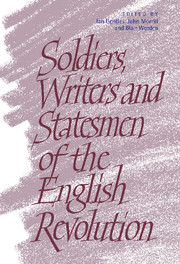Book contents
- Frontmatter
- Contents
- Preface
- Austin Woolrych: an appreciation
- 1 Secret alliance and Protestant agitation in two kingdoms: the early Caroline background to the Irish Rebellion of 1641
- 2 Of armies and architecture: the employments of Robert Scawen
- 3 George Digby, Royalist intrigue and the collapse of the cause
- 4 The iconography of revolution: England 1642–1649
- 5 The casualties of war: treatment of the dead and wounded in the English Civil War
- 6 ‘A bastard kind of militia’, localism, and tactics in the second civil war
- 7 Cromwell's commissioners for preserving the peace of the Commonwealth: a Staffordshire case study
- 8 Colonel Gervase Benson, Captain John Archer, and the corporation of Kendal, c. 1644—c. 1655
- 9 Repacifying the polity: the responses of Hobbes and Harrington to the ‘crisis of the common law’
- 10 Equality in an unequal commonwealth: James Harrington's republicanism and the meaning of equality
- 11 John Milton and Oliver Cromwell
- 12 From pillar to post: Milton and the attack on republican humanism at the Restoration
- 13 ‘They that pursew perfaction on earth …’: the political progress of Robert Overton
- 14 Locke no Leveller
- A bibliography of the writings of Austin Woolrych, 1955-95
- Index
12 - From pillar to post: Milton and the attack on republican humanism at the Restoration
Published online by Cambridge University Press: 10 November 2009
- Frontmatter
- Contents
- Preface
- Austin Woolrych: an appreciation
- 1 Secret alliance and Protestant agitation in two kingdoms: the early Caroline background to the Irish Rebellion of 1641
- 2 Of armies and architecture: the employments of Robert Scawen
- 3 George Digby, Royalist intrigue and the collapse of the cause
- 4 The iconography of revolution: England 1642–1649
- 5 The casualties of war: treatment of the dead and wounded in the English Civil War
- 6 ‘A bastard kind of militia’, localism, and tactics in the second civil war
- 7 Cromwell's commissioners for preserving the peace of the Commonwealth: a Staffordshire case study
- 8 Colonel Gervase Benson, Captain John Archer, and the corporation of Kendal, c. 1644—c. 1655
- 9 Repacifying the polity: the responses of Hobbes and Harrington to the ‘crisis of the common law’
- 10 Equality in an unequal commonwealth: James Harrington's republicanism and the meaning of equality
- 11 John Milton and Oliver Cromwell
- 12 From pillar to post: Milton and the attack on republican humanism at the Restoration
- 13 ‘They that pursew perfaction on earth …’: the political progress of Robert Overton
- 14 Locke no Leveller
- A bibliography of the writings of Austin Woolrych, 1955-95
- Index
Summary
Austin Woolrych's introduction to volume vii of the Complete Prose Works of John Milton provided an exemplary contribution to Milton studies. By describing the historical context in which Milton wrote at the Restoration, Woolrych gave signal assistance to literary scholars working on the writings, published and unpublished, in which Milton responded to the turbulent events of 1658—60. Subsequent scholarship has been much in his debt. The present argument returns to Milton in this connection, and especially to responses in 1660 to Milton's pamphleteering. The emphasis here will be not on Milton's achievement but on the tactics his three main opponents chose in writing against him in March—April 1660. Their varied responses to the republicanism especially of The Readie and Easie Way (1660) were often couched as attacks not just on Milton's politics, but also on the very idiom in which Milton had proposed political change. His republican invocation of Ciceronian ideals of public service could be made to appear outmoded by pamphlets that instead dramatised arguments from interest, the political currency of an increasingly commercial society. In particular, the rhetorical splendour of Milton's prose made him vulnerable to the coffee-house style of his antagonists. The imperious claim to objectivity in Milton's grand style might be brought low by their studied assumption that he wrote for personal advantage, and their sharp questioning of his prescriptions for the public good. The aggressive subjectivity of such pamphleteering, especially in the hands of Roger L'Estrange and Samuel Butler, may be read as anti-humanist as well as anti-republican.
- Type
- Chapter
- Information
- Soldiers, Writers and Statesmen of the English Revolution , pp. 265 - 285Publisher: Cambridge University PressPrint publication year: 1998
- 1
- Cited by

